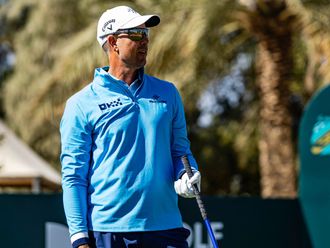Abu Dhabi: July 2, 2005 — the night New Zealand All Blacks fly-half Dan Carter became a global rugby superstar with a superlative display that showcased every aspect of his voluminous talent.
Aged just 23, Carter scored a record 33 points for the All Blacks against the British and Irish Lions in a 48-18 rout to win the second Test in a series they would go on to seal 3-0.
One of the most definitive performances in rugby history was embellished by impeccable goal-kicking and two sublime tries, the most indelible of which left his much-vaunted opposite number Jonny Wilkinson flailing helplessly as Carter waltzed around him.
It was a seminal moment, encapsulating the fact that Carter had unambiguously superseded Wilkinson, whose drop goal famously won the 2003 World Cup for England, as the game’s pre-eminent outside half.
Quite simply, this was an evening when the irrepressible fly-half was the perfect 10.
In an exclusive interview with Gulf News ahead of the Rugby World Cup in England, which begins on September 18, Carter said of his greatest-ever game: “I guess that’s what you’re always striving for, perfection. Although I missed one kick, that was as close to perfection as I’ve been that night. My running game, my kicking game, everything seemed to gel that night and it was one of the most special nights of my career.
Unique game
“I never realised how unique that game was until I got to the media section straight after the game,” he added. “There were so many media asking me about the brilliant game I’d played. I didn’t even know I’d scored 33 points and had such a great night at the office to break records.
“To turn on my phone and see lots of messages from my friends and family was amazing.”
Ten years on, and Carter’s place in the pantheon of rugby legends is unimpeachable. The 33-year-old holds the Test points world record with 1,516 from 106 games for the All Blacks, and has won myriad titles for club and country.
After the World Cup, he will also become the game’s highest-paid player, reportedly becoming the first to earn £1 million (Dh3.67 million) a year at France’s Racing Metro, who he will join from hometown side Canterbury Crusaders. Yet Carter’s career is not just a story of untrammelled success, but also one of agonising injuries and crushing failures.
His most devastating experience came when a torn groin tendon during the 2011 World Cup in his homeland deprived him of the chance to taste eventual global glory with his teammates.
How does he reflect on that savage disappointment?
“I have a medal and I stayed a part of the squad, but it didn’t feel the same as being out there on the pitch,” he recalled.
With that heartache as his driving force, Carter is fiercely determined to end his garlanded All Blacks odyssey on a high and be part of the first back-to-back World Cup triumphs in history.
He said: “While the All Blacks want to become the first team ever to win back-to-back World Cups, there’s also some personal, unfinished business for me. I never thought I’d be here playing in a fourth World Cup and I want to make the most of this one and succeed.”
Who does he rate as the main contenders to the All Blacks’ crown?
“I’d say South Africa and Australia, who have people that can win any game on their day,” he said. “Ireland have been great in the last couple of years and England will be a dominant force on their own turf. They’ve beaten us there before, but the beauty of a World Cup is you can pick up an injury to a key player and there are bound to be upsets.”
Ominously for their World Cup rivals, Carter says the world’s number one side are approaching the event without a shred of complacency.
Staying on top
He said: “We were extremely proud of winning the World Cup for the first time in 24 years in 2011, but we didn’t want to leave it there. We put a lot of hard work into staying as the number one in the world as long as we can.
“Every team wanted to beat us, but our mindset of wanting to be the best in the world has given us confidence and self-belief that we will win no matter the situation we get ourselves in.”
Their orchestrator-in-chief embodies that philosophy perfectly.
He added: “You always want to strive to perform at your peak. Ten years on, and I might not be able to play a game like that [against the Lions] ever again.
“But I am definitely more tough and have a lot more experience, so I am still striving to play as well as I know I can while I’m still putting my boots on.”
Despite a succession of physical issues in recent years and subsequent below-par performances, Carter’s body and game are ostensibly in rude health.
In his final game for New Zealand on home soil last month, he delivered a performance that recalled his halcyon days, kicking with metronomic precision and attacking with verve and impunity as the All Blacks demolished Australia 41-13.
Coach Steve Hansen, a gruff and uncompromising character who does not offer praise lightly, said: “He was special tonight — the Dan Carter of old. He’s been questioned by a lot of people, and he stood up.”
It’s a testament to Carter’s iron will and endurance that he continues to scintillate despite a tumultuous 12-year international career.
Aside from his 2011 nadir, he has had to recover from setbacks such as when a year’s sabbatical at French Top 14 outfit Perpignan was cut cruelly short when he ruptured his Achilles tendon in January 2009.
Even the phlegmatic Carter’s resolve must have been severely tested by yet another injury, a broken leg, in the Super Rugby final in 2014.
Burgeoning doubts over his ability to withstand the rigours of rugby appeared thoroughly justified, with the former All Black prop Craig Dowd remarking earlier this year: “His body is a bit of a liability.”
Carter copes with such criticism as languidly as he speaks and plays, however.
Closing out criticism
“I don’t read too much into it, to be honest,” he said. “Basically I just want to go out there and have fun and play. I’ve had a lot of injuries, but my body feels really good right now.
“You’re in a contact sport and are going to take knocks and be injured, which has happened to me unfortunately in the last year and this year. I’m confident I can come back and be at the highest level again.”
Given his age and ailments, Carter says his training regime has been pared down from heavy weights sessions to activities such as Pilates, swimming and biking.
“It’s more recovery focused now to get over the bumps and bruises,” he said.
Yet, aside from his unwavering commitment to rugby, Carter insists he is “a chilled, relaxed guy”, with a variety of outside interests to help him unwind.
Is there anything that annoys him?
“Jeez, I don’t know,” Carter, whose supremely down-to-earth demeanour is at odds with his exalted status, said. “I am pretty relaxed. Obviously getting married helps.”
Light-hearted fun is also crucial to Carter remaining level-headed — he has previously enjoyed nights out in superhero costumes with friends such as the former All Black lock Ali Williams.
“Rugby, especially in New Zealand, is like a religion,” he said. “It’s all consuming at times, so it’s important that you have balance in your life. It’s important to focus 100 per cent in training, but in down time or at weekends, it’s important that you do the things you love.
“I love hanging out with my mates and going kiteboarding or DJing to take my mind off rugby.”
A relaxed and rejuvenated Carter bodes well for the All Blacks’ bid to win a historic third World Cup, not to mention his never-ending quest to be the perfect 10.








